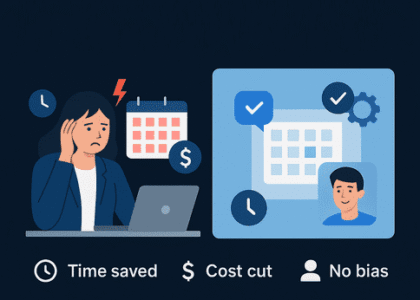Introduction: Why HR Must Embrace AI in 2025
The role of Human Resources is rapidly evolving. From traditional administrative functions to strategic talent development, HR departments are under immense pressure to deliver impactful employee experiences while navigating a dynamic workforce landscape. In this transformation, Generative AI is emerging as a powerful ally. Its ability to automate routine tasks, personalize interactions, and generate real-time insights makes it a critical component of modern HR strategies. Embracing Generative AI Integration Services empowers organizations to enhance efficiency, foster innovation, and lead with empathy in the digital age.
What Are Generative AI Integration Services?
Generative AI Integration Services involve embedding AI systems capable of creating content, learning from patterns, and making intelligent decisions within existing HR workflows. These services are typically provided by specialized AI development companies and are designed to optimize and scale people management processes. From writing job descriptions and generating employee feedback summaries to designing adaptive learning modules and powering chatbots, these integrations go beyond automation to provide a more human-centric experience.
Key Features of Generative AI in HR
Natural Language Processing (NLP)
Enables AI to understand, interpret, and respond to employee queries in a human-like manner.
Personalization Engines
Customize training, feedback, and career pathing based on employee data.
Predictive Analytics
Forecast talent needs, turnover risks, and engagement trends.
Conversational Interfaces
AI-powered chatbots support employees 24/7 for HR services.
Real-World Use Cases in HR and Talent Management
Recruitment
AI models screen resumes for relevant skills, summarize applications, and even draft personalized outreach messages. For instance, companies like Unilever use AI to assess candidates through video interviews with NLP and emotion recognition.
Onboarding
AI-driven onboarding bots introduce new hires to systems, policies, and workflows while addressing FAQs in real-time, ensuring a smooth and engaging experience.
Learning & Development
Generative AI crafts custom training content, quizzes, and simulations based on employee performance data, facilitating continuous learning.
Performance Management
AI helps managers by drafting performance reviews, identifying coaching opportunities, and analyzing productivity metrics.
Employee Engagement
Tools like sentiment analysis and pulse surveys identify potential dissatisfaction or burnout before it becomes a retention issue.
How Generative AI Enhances Employee Experience & Productivity
Personalized Growth Paths
Generative AI supports tailored upskilling programs and adaptive learning based on role and behavior.
Human-Centric Automation
By offloading repetitive tasks to AI, HR professionals can focus on empathy-driven work like mentorship and organizational culture.
Proactive Decision-Making
Real-time dashboards and alerts inform timely actions across recruitment, retention, and compliance.
Challenges and Ethical Considerations
Data Privacy & Security
HR deals with sensitive employee data. Any AI deployment must comply with regulations like GDPR and ensure robust data protection protocols.
Bias Mitigation
AI algorithms trained on biased data can unintentionally perpetuate discrimination. Regular audits, transparency in model training, and diverse data sets are essential.
Human Oversight
AI should assist, not replace, human judgment in key decisions such as hiring, firing, or promotion. Maintaining a balance between automation and empathy is crucial.
Employee Trust
Organizations must communicate clearly about how AI is used, what data is collected, and how decisions are made to build transparency and trust.
Steps to Successfully Integrate Generative AI in Your HR Stack
1. Define Your Objectives
What specific HR challenges are you trying to solve with AI? Start with measurable goals.
2. Collaborate with Experts
Partner with a Generative AI Development Company experienced in enterprise and HR integrations.
3. Engage Stakeholders
Involve IT, legal, and HR leaders early in the process to align expectations and address concerns.
4. Implement Pilot Programs
Begin with limited-scope initiatives such as resume screening or onboarding assistants.
5. Upskill Your HR Team
Provide training on how to use and interpret AI tools, ensuring your team is empowered to lead the transformation.
6. Iterate and Improve
Monitor outcomes, gather feedback, and continuously refine your AI integrations.
Future Outlook: HR Transformation Through AI
AI as a Strategic Co-Pilot
We are entering a new era where AI supports HR professionals across all roles—from recruitment to compliance—enabling faster, better, and more ethical decisions.
Enhancing Organizational Agility
Generative AI allows HR teams to respond quickly to changing workforce needs and market conditions.
Supporting Remote and Hybrid Workforces
AI-powered tools ensure seamless communication, engagement, and productivity regardless of location.
Shaping Inclusive Cultures
AI can foster diversity, equity, and inclusion initiatives by minimizing bias and providing data-driven insights.
Conclusion: Leading People with Technology, Not Replacing Them
The integration of generative AI into HR is not a threat to human work but a catalyst for more meaningful human interactions. By automating repetitive tasks, offering deep insights, and enabling personalization at scale, AI allows people leaders to focus on what truly matters: nurturing talent, fostering culture, and guiding organizational change. The future of HR is human-centered, powered by ethical AI, and designed to create better workplaces for all.






